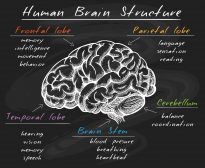Definition
noun, plural: necroses
Premature death of cells in a living tissue or organ caused by the progressive degradative action of enzymes
necrotic, adjective
Of, characterized by, relating to, produced by, or affected with necrosis
Supplement
Necrosis is a term pertaining to the bodily injury characterized by the localized death of cells in a living tissue or organ. Necrosis is different from apoptosis in a way that the former is a premature death of cells or tissues. In apoptosis, the death of a cell occurs naturally and according to the apoptotic signal transduction pathway. In necrosis, the death of a cell is caused not by such pathway but by a mechanism involving the activation of certain receptors resulting in the loss of cell membrane integrity.1 Factors that lead to necrosis are infection, toxins, and trauma.
Word origin: Ancient Greek nékrōsis (death)
See also:
- apoptosis
- autolysis
- gangrene
Related term(s):
Reference(s):
1Proskuryakov SY, Konoplyannikov AG, Gabai VL; Konoplyannikov; Gabai (2003). “Necrosis: a specific form of programmed cell death?”. Exp. Cell Res. 283(1): 1–16.







